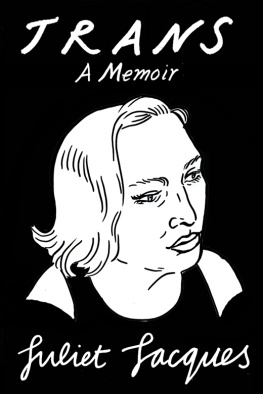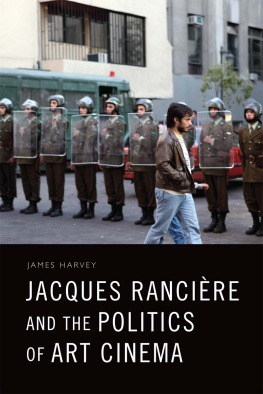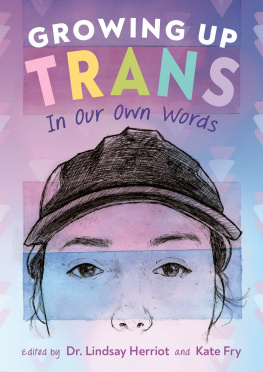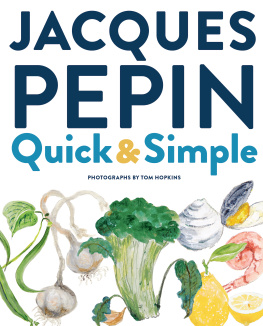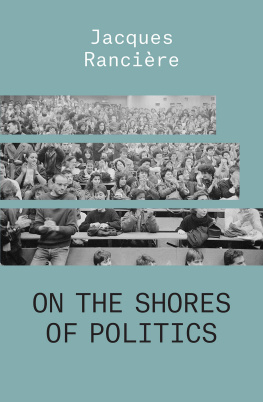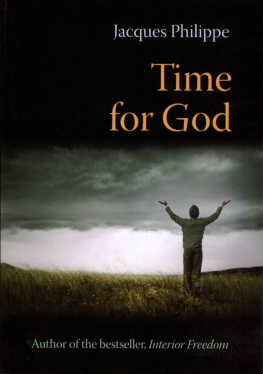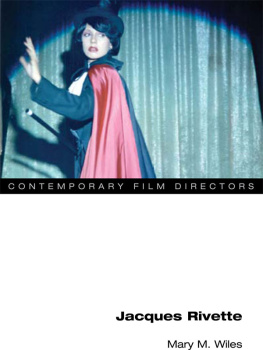This book grew out of the Transgender Journey series that I wrote for the Guardian between 2010 and 2012. The first chapter reprints my article Time for Sex Reassignment Surgery at Last as it was published on the Guardian website on 30 August 2012, with a few minor alterations thanks to Pamela Hutchinson for sub-editing it (and sharing my love of silent cinema), Kate Carter and Rachel Dixon for editing each piece, and Chris Borg for helping me get it commissioned. Parts of the text also appeared in articles for the New Statesman and Aeon, so thanks to Helen Lewis and Marina Benjamin for commissioning and editing those.
I must thank my agent, Jamie Coleman, for his encouragement and advice, and my editor at Verso, Leo Hollis, who constantly fought my corner and restrained my most aggressively meta-textual impulses. Thanks to all at Verso, including Sarah Shin, my publicist, Bob Bhamra for the book production, Rowan Wilson for getting it into shops, and Mark Martin and Sophie Hagen for copy-editing. I am also grateful to Joanna Walsh for her beautiful artwork, and Sheila Heti for giving up her time for the epilogue.
This also seems an appropriate time to thank my parents (or perhaps apologise to them) for their patient understanding of the difficulty and necessity of writing about them, and more generally. I should also mention that some names have been changed to protect anonymity where necessary.
I am grateful to friends who spoke to me about past experiences, helping me shape them into the constructed reality of the book, and then checked over the text to corroborate my memory: Corinne Atherton, Alice Black, Carl Boardman, Sarah Bradley, Lindsey Dryden, Tania Glyde, Jason Hall, Helen King, Jet Moon, Joe Stretch and Phil Vallon. Several people offered to read the manuscript, and some suggested changes, corrections and improvements: Christine Burns, Petra Davis, Scott Esposito, Hannah Gregory, Olivia Laing, Huw Lemmey, Alexis Lothian, Roz Kaveney and Nina Power.
I had kind words of support from plenty of people, including Jo Dawson, Dawn Foster, Lorna Scott Fox, Jean-Philippe Toussaint and Zakia Uddin, and finally Ker Wallwork, who came to me just as I began the final draft, took my hand and hauled me over the line.
Transgender Journey
Six weeks before sex reassignment surgery (SRS), I am obliged to stop taking my hormones. I suddenly feel very differently about my forthcoming operation. Id previously seen transition as a marathon: surgery was like breaking the tape, but the race was won far earlier. Now I reconsider: perhaps this is more like a difficult cup final after some hard previous rounds.
It consumes my conversations as it inches closer. I am constantly asked how I feel: everyone expects a mixture of excited and nervous, and they are right. Above all, Ill be glad when it is over.
I take a little holiday in late June 2012, staying with friends in Scotland, and travel back on the first day of July. Then, for the next fortnight, my concerns over the practical, physical and psychological effects of SRS intensify by the day.
My psychotherapist, whom Ive been seeing all year, tells me that Ive barely touched on the surgery, so I devote my final pre-surgical appointment to it. After an hour of airing my anxieties, I feel calm and able to continue.
Five days before checking into hospital, I sign off. Returning from the Jobcentre, a man with a taste for shemales (his word) follows me home, making me feel far less secure in my house my sanctuary in a life that has felt in constant chaos. I break down in tears, crying for thirty years of feeling like an outsider, twenty years of knowing this to be related to my gender, ten years of exploring it, three years of transition and two years of writing about it, with all their stresses and traumas simultaneously hurtling to the fore.
For four days, everything makes me weep. At first its painful, then cathartic, and finally just annoying having not cried when I expected to for years, the sight of every ornament, every poster in my house sets me off, and I dont know when itll stop. Eventually, I realise I need to get out: I visit old friends in Brighton, who indulge me as I discourse about the run-up to surgery and my feelings about it.
I return a day before admission: having to address the practicalities pulls me together, as I ensure I have everything Ill want or need during the seven-day stay. Ive never been seriously ill or injured, so Ive sought advice on what to take: I buy slippers and a crossword book. Once Ive got everything on my list, and packed, I feel completely relaxed. I go to bed content, close my eyes, and then see a car crash outside my bedroom window. Its so vivid, it takes several moments to realise that the flaming wreckage is no more than the invention of my hyperactive subconscious, but once I do, I get a solid nights sleep my last for some time.
Obsessed with being brave and independent, Id travelled alone to my previous surgical appointments. This time, on advice, Ive arranged for my friend Tania Glyde to take me to hospital. She arrives around midday: we eat in my favourite caf and then get the Tube to Hammersmith, well before I have to report to Charing Cross hospital reception at 4 p.m. We say little, putting our arms round each other, but once Ive checked in, she gives me some earplugs and a cuddly tiger (Youll need a soft toy, trust me). Then she goes, telling me to surrender myself to the nurses, and I find my bed in F bay on the Marjorie Warren ward.
There are six beds, with most but not all occupants also undergoing SRS. Reassuringly, there are two people who had surgery a day before, who can hold conversations and move unaided. We chat before the nurses take my weight and blood pressure, measuring me for stockings to fight deep vein thrombosis as Ill be spending so long in bed. I order dinner and then sleep, struggling more with the sweltering temperature than anything else.
At 5:30 a.m. Im woken for an enema: they have to thoroughly clear my bowels before the procedure. Its not pretty but I take it, shower and return to bed. At 7 a.m. the surgeon enters with two consent forms one for the hospital, the other for me. He asks if I will allow the tissue removed to be used for medical science. In the hazy half-light, I agree (to the disappointment, I imagine, of friends whove asked if they can have it). Ill see you soon, the surgeon says. The anaesthetist comes soon after and asks several questions before I lie back down.

